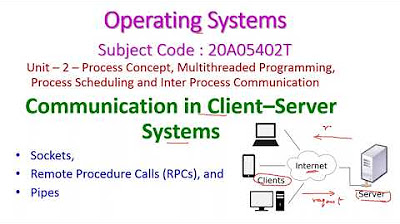What is a server? Types of Servers? Virtual server vs Physical server 🖥️🌐
Summary
TLDRThis script explains the concept of a server in computing, highlighting its role as a dedicated device providing various services to clients in a client-server model. It distinguishes between physical and virtual servers, emphasizing the importance of reliability and redundancy in server architecture to ensure continuous operation. The video also touches on the necessity of high-performance CPUs and RAID configurations for data protection. It briefly introduces different types of servers, such as web, database, and email servers, and mentions the use of server operating systems designed for stability and handling numerous connections.
Takeaways
- 💻 A server is a dedicated computer or device that provides functionality on behalf of other devices or clients.
- 🏢 Servers can be dedicated to handle one service each or multiple services on the same machine, typically in larger and smaller organizations respectively.
- 🔒 Servers enable control, distribution, and protection of information.
- 📊 There are two main types of servers: physical servers and virtual servers.
- 🌐 Most servers in enterprises and cloud environments are virtual servers, which use hypervisors to divide physical servers into multiple virtual servers.
- ⚠️ Businesses rely on servers to run 24/7 as server failure can lead to significant losses.
- 🔄 Servers need to be reliable and redundant, with high computing CPUs and RAM, and components that can be swapped without impacting the entire server.
- 🛠️ RAID configuration in servers allows data to be copied onto multiple disks, ensuring no data loss and continued operation even if a hard drive fails.
- 📧 Types of servers include web servers, email servers, DNS servers, and database servers, each serving different functions.
- ⚙️ Servers use robust operating systems like Linux, Windows Server, and macOS Server, designed to handle thousands of concurrent connections.
Q & A
What is a server in the context of computing?
-A server in computing is a dedicated computer or device that provides functionality on behalf of other devices or clients, operating within a client-server model architecture.
What is meant by the term 'services' in the context of servers?
-Services refer to the functionalities provided by servers, such as sharing resources or data among multiple clients, or performing computations for a client.
Can a server be dedicated to only one service?
-Yes, a server can be dedicated to handle one service, such as having a dedicated server for a website, data storage, or email. This model is commonly used in larger organizations.
What is the difference between a physical server and a virtual server?
-A physical server is a dedicated server using traditional CPU and RAM resources, while a virtual server uses a hypervisor to divide the physical server into multiple virtual instances that share resources.
Why are servers important for businesses?
-Servers are vital to an organization because they run 24/7 and support critical operations. Server failures can lead to business losses or jeopardize operations.
What does it mean for servers to be set up redundantly?
-Redundant setup means that if one component or server fails, it shouldn't impact the entire system, as there are backup components or servers in place to maintain functionality.
What is the purpose of RAID configuration in servers?
-RAID (Redundant Array of Independent Disks) configuration allows data to be copied onto multiple disks. If a hard drive fails, it can be replaced without shutting down the server, and RAID will automatically rebuild the data onto the new drive.
What are some examples of different types of servers?
-Examples of different server types include web servers, database servers, email servers, and DNS servers, each hosting specific services or data.
What is an application server and what does it do?
-An application server is a program that handles all application operations between users and an organization's backend business applications or data, typically used for complex transaction-based applications.
What is the role of a server operating system?
-A server operating system, such as Linux, Windows Server, or macOS Server, is robust and stable, designed to run non-stop and handle thousands of concurrent connections.
Why is high computing CPU power important for servers?
-High computing CPU power is important for servers to handle intensive tasks, support multiple users, and maintain performance for complex applications and services.
Outlines

This section is available to paid users only. Please upgrade to access this part.
Upgrade NowMindmap

This section is available to paid users only. Please upgrade to access this part.
Upgrade NowKeywords

This section is available to paid users only. Please upgrade to access this part.
Upgrade NowHighlights

This section is available to paid users only. Please upgrade to access this part.
Upgrade NowTranscripts

This section is available to paid users only. Please upgrade to access this part.
Upgrade Now5.0 / 5 (0 votes)





